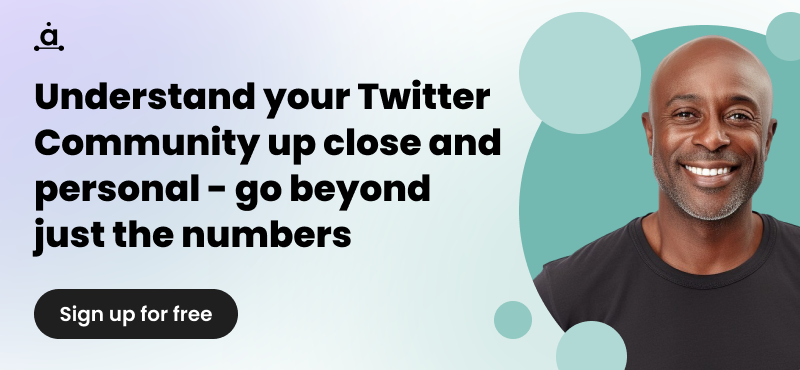La seule liste de contrôle pour l'optimisation des campagnes sur les médias sociaux dont vous aurez besoin
En tant que spécialistes du marketing, nous avons tous passé des nuits blanches à essayer de comprendre précisément comment optimiser nos campagnes sociales. Si vous y parvenez, vous êtes la personne la plus populaire de l'entreprise, car vous attirez des légions de prospects et une foule de clients. Si vous vous trompez, des mois de travail acharné n'auront servi à rien et vous devrez vous justifier auprès de votre équipe de vente... voire de votre patron.
Nous ne pouvons pas scénariser votre campagne sociale, c'est votre travail. Ce que nous pouvons faire, c'est vous donner les ingrédients qui permettront à votre campagne de se démarquer. Utilisez cette liste de contrôle pour créer des campagnes de médias sociaux optimisées qui génèrent des résultats.
Fixez vos objectifs
Que voulez-vous réellement accomplir ? Souhaitez-vous augmenter le nombre de vues d'une vidéo, le nombre d'abonnés à une lettre d'information ou dépasser le million de followers ? Vous devez vous fixer des objectifs clairs, ce qui vous aidera à déterminer si votre campagne a été un succès. N'oubliez pas de fixer des objectifs SMART :
- Spécifique- Soyez clair sur ce que vous voulez obtenir
- Mesurable- Veillez à ce que l'objectif soit quantifiable. Ainsi, au lieu de dire que vous voulez atteindre une "bonne portée", essayez plutôt de dire "atteindre 50 millions de personnes".
- Atteignable- Votre objectif doit être ambitieux, mais vous devez être capable de l'atteindre avec les compétences, les fonds et les outils dont vous disposez.
- Réaliste- Même s'il s'agit de quelque chose que vous pouvez techniquement faire, serez-vous en mesure de le faire de manière réaliste ?
- Limités dans le temps- Vous ne disposez pas d'une éternité, ces objectifs doivent être atteints à un moment donné.
Voici donc quelques objectifs SMART pour vos campagnes de médias sociaux :
- Utiliser les cartes Twitter pour obtenir 500 inscriptions à la newsletter d'ici la fin de l'année200 personnes utilisent l'offre promotionnelle X dans les trois mois suivant le lancement de la campagne
- Atteindre plus de 10 000 followers sur tous les comptes sociaux impliqués dans la campagne avant Noël.
Test A/B de différentes idées
'Voici comment notre produit vous donne le facteur X'
'Vous avez besoin de notre produit, voici Y'
A ou B, X ou Y. Savez-vous lequel des deux votre public préférerait ? Sans aucun doute, pourriez-vous dire lequel serait le plus performant ? Faites le vide dans votre tête en éliminant les conjectures.
Utilisez les tests A/B pour tester des call-to-actions spécifiques, des images, des mots, des couleurs, des phrases et pratiquement tous les aspects personnalisables de votre campagne. L'important est de ne tester qu'une seule variable à la fois pour obtenir un véritable test A/B. Cela vous permet de déterminer précisément pourquoi votre public a aimé un article plus que l'autre.
Pour optimiser vos campagnes publicitaires sur Twitter, vous pouvez regrouper plusieurs Tweets promus dans une seule campagne. Twitter déterminera alors celui qui est le plus performant et commencera à le montrer à un segment plus large de l'audience. Nous recommandons un minimum de trois Tweets pour vous assurer de couvrir un bon nombre d'angles potentiels.
Le bon moment
Le monde des médias sociaux évolue rapidement. Les tendances vont et viennent, et des centaines de nouveaux messages inondent la ligne de temps d'un utilisateur en quelques minutes seulement. Si vous publiez vos messages à des heures aléatoires, ils risquent de se retrouver au fond du fil d'actualité.
C'est pourquoi il est si important de choisir le bon moment et de les publier à un moment où votre public est le plus susceptible de les remarquer et de s'y intéresser. Plus il y a d'engagement dans les premières minutes, plus votre message sera visible et plus vous aurez de chances d'atteindre votre cible.
Assurez-vous de connaître le meilleur moment pour publier sur tous vos canaux de médias sociaux. Bien que plusieurs études suggèrent le meilleur moment pour publier, le moment idéal dépend de votre secteur d'activité et de votre public. Consultez les outils d'analyse qualitative de Twitter pour avoir une idée du moment où vos messages sont les plus performants et où votre public est le plus actif.
Pour Twitter, utilisez la plateforme Audiense Connect pour déterminer le meilleur moment pour Tweet pour votre marque. La plateforme analyse le moment où votre communauté est en ligne et suggère ensuite le meilleur moment pour Tweet en fonction de cette analyse.

Créer un lien émotionnel
N'oubliez pas que les personnes que vous souhaitez atteindre sont des êtres humains - de vraies personnes avec de vraies émotions. Leur comportement et leurs décisions d'achat sont souvent influencés par des émotions. C'est pourquoi les campagnes qui ont un impact émotionnel doivent figurer sur votre radar marketing.
Veillez à ce que vos campagnes suscitent des émotions, qu'il s'agisse de nostalgie, d'excitation ou de plaisir. Par exemple, la campagne de Spotify à l'occasion de la Journée internationale de la femme visait à susciter des réactions émotionnelles profondes grâce à des récits audio de femmes du monde entier. Ces créatrices ont partagé des messages réfléchis et perspicaces, soit à l'égard de leur passé, soit à l'égard d'autres femmes qui ont eu une influence dans leur vie.
Pour célébrer #IWD2022, nous continuons à mettre en lumière la musique et les histoires de femmes du monde entier.
- Spotify (@Spotify) 8 mars 2022
Écoutez une collection de lettres audio de femmes artistes, conteuses et activistes partageant leur amour à leur moi passé 💐 https://t.co/N0r8ONl8dc pic.twitter.com/89ZMdWA0CT
Utiliser des visuels accrocheurs
Les visuels peuvent faire toute la différence sur les médias sociaux, que ce soit sur Twitter, Instagram ou même LinkedIn. C'est là que vous pouvez vraiment inciter les gens à prêter attention à votre campagne. Utilisez des visuels qui sont uniques à votre campagne et des visuels qui attirent l'attention.
Vous voudrez peut-être créer des graphiques qui s'alignent sur l'identité visuelle de votre marque tout en mettant clairement en évidence le message de votre campagne. Vous pouvez également opter pour des photographies qui mettent votre produit en valeur. Quel que soit le type de visuel, assurez-vous qu'il attire l'attention, qu'il est de haute qualité et qu'il correspond à la marque.
Par exemple, ABLE, la marque de mode éthique, a lancé une nouvelle série dans laquelle elle présente des femmes qui inspirent son équipe. Ils ont utilisé Instagram pour partager un graphique original accrocheur avec une photo de la femme présentée ainsi que son identité et ce qu'elle fait. La conception graphique s'aligne également sur l'identité visuelle épurée et minimale d'ABLE.
Obtenir l'aide d'influenceurs
Grâce à leur portée massive, les influenceurs peuvent faire passer votre campagne devant des millions de personnes, même avec un seul message. Il est donc logique de les impliquer et de leur demander d'amplifier la portée de votre campagne sur les médias sociaux.
Mais vous devez faire très attention aux influenceurs avec lesquels vous vous associez. Assurez-vous qu'ils sont influents dans le secteur que vous ciblez, c'est-à-dire qu'ils doivent être en mesure d'influencer les personnes que vous souhaitez atteindre. Choisissez vos influenceurs en fonction de facteurs clés tels que la taille de leur audience, leur situation géographique, leur niche et leur base d'audience.
Commencez par examiner votre communauté Twitter pour voir qui l'influence. Vous pouvez également utiliser la plateforme Audiense Connect pour parcourir votre communauté et trouver des personnes célèbres et influentes qui suivent déjà votre marque. Ces personnes pourraient être les influenceurs idéaux pour votre campagne car elles ont déjà montré un intérêt pour votre marque, ce qui pourrait rendre le partenariat pertinent et authentique.

Mesurez votre succès
Celle-ci doit être commencée en premier et terminée en dernier. Avant de vous lancer à corps perdu dans la planification de votre campagne sociale multiplateforme et étoilée, il est important de savoir où vous en êtes au début. Sinon, comment saurez-vous si vous vous êtes amélioré à la fin de la campagne ? Un bon outil d'analyse des médias sociaux peut vous montrer plusieurs aspects de votre profil, les représenter sur une période donnée et vous permettre de suivre et de gérer toute activité de campagne de manière transparente. Il est également intéressant de voir quelles ont été vos performances au cours d'une période similaire dans le passé afin de pouvoir établir des rapports comparatifs.
Principaux enseignements
- Fixez vos objectifs
- Test A/B de différentes idées
- Le bon moment
- Créer un lien émotionnel
- Utiliser des visuels accrocheurs
- Obtenir l'aide d'influenceurs
- Mesurez votre succès
Voilà donc les bases que vous devez couvrir avant de lancer votre campagne sociale. Mettez toutes les chances de votre côté et assurez-vous que vous avez mis toutes les chances de votre côté pour réussir votre campagne. Y a-t-il d'autres choses que vous aimez faire pour vous assurer que vous êtes sur la bonne voie pour gagner dans les médias sociaux ? N'hésitez pas à nous faire part de vos commentaires dans la section ci-dessous.





.png?width=60&name=image%20(62).png)
